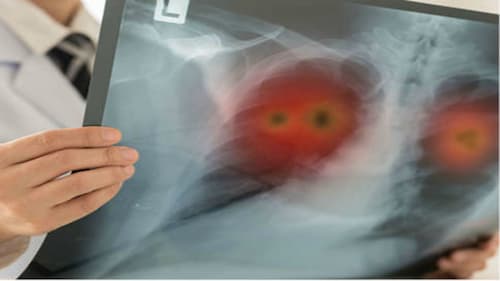
Lung Cancer Challenges In Pandemic Times
As the global impact of Covid-19 increases, the diagnosis and management of cancer patients who are at increased risk have been a constant challenge. November is observed as Lung Cancer Awareness Month. Lung cancer, which has been the most common cause of cancer deaths worldwide, possess a greater risk of both detrimental outcomes in delaying diagnosis and treatment, as well as propensity to develop Covid-19 related complications.
India is home to a substantial number of tobacco users both smoke and smokeless form coupled with increased industrialisation, air pollution contributing to increased incidence of lung cancer in both genders.
The traditional symptoms of lung cancer being persisting cough, blood in sputum, shortness of breath, weight loss, difficulty in swallowing can maybe lead to accidental detection in the early stage. Lung cancer screening plays an important role in detecting the disease in stage 1 and thus can provide a very high rate of cure. As per GLOBOCAN 2018, 58.5% of all lung cancer cases were from Asia and thus there is an urgent need for screening. Various methods have been tried such as chest radiography, sputum cytology, however low dose computer tomography (LDCT) has shown to be an effective screening modality for lung cancer across various international and national guidelines. In developing countries like India, the challenges of cost-effectiveness and high prevalence of tuberculosis complicate the scenario. Unfortunately, we are yet to have any standardised protocol for lung cancer screening.
Covid-19 pandemic has created a global emergency in terms of the magnitude of infection, the spectrum of symptoms, susceptibility among elderly, co-morbid and cancer patients. As Covid-19 is a virus that primarily attacks the respiratory tract and lungs, anything that harms the lungs can and result in more severe effects if people get infected. There are CT scan changes in lungs due to Covid infection which mimic lung cancer related pneumonitic changes, thus, further complicating the scenario.
Across the globe, several studies indicate lung cancer patients have a higher risk of covid pneumonia and mortality. On the other hand, delaying treatment for early-stage curable diseases, locally advanced symptomatic patients and also palliative care has pros and cons. Several international societies dealing with lung cancer management have strongly advocated risk-based assessment for lung cancer treatment be it surgery, radiotherapy, chemotherapy in isolation or combination, before delaying treatment. Despite that, a recent publication in JAMA oncology suggested 60% patients experienced a delay in lung cancer treatment. Another article in lancet Oncology also hinted at a possible delay in diagnosis leading to excess cancer mortality in coming days.
In the times of Covid-19 pandemic smoking also increases the risk of being infected by the virus. Hence it is advisable to practice infection prevention techniques and carefully follow the precautionary measures which include taking immediate steps to quit smoking. On a personal level one can try deep breathing exercises, spiritual mantra chanting and music therapy which will enhance both smoking cessation effort and lung breathing capacity. It also reduces the risk of other health problems such as heart attacks and strokes.
Hospitals and healthcare professionals have been at the forefront of Covid-19 and a very strict infection control protocol is being followed across the globe. Likewise Covid-19, lung cancers if not treated at right time can lead to severe morbidity and high mortality rates. In a country like India where the access to the right diagnosis and right treatment remains challenging, any sort of delay in managing lung cancer should never be encouraged. Counselling of patients and family members in making the right decision remains the key amidst the pandemic. To adapt to the new normal and the changes while following diagnostic and treatment options for lung cancer for an effective cure should be of prime importance.
The writer is Consultant Radiation Oncologist at HCG Cancer Centre, Mumbai